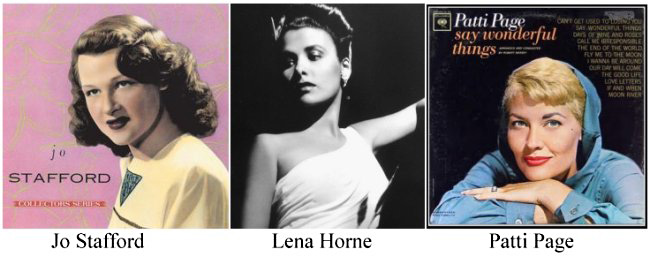A Golden Age of Popular Song
Today, a time when popular singers really sang. The University of Houston's College of Engineering presents this series about the machines that make our civilization run, and the people whose ingenuity created them.
There was an age, seventy years ago, when popular singing was high art. Jo Stafford was my special favorite, among so many other great singers. Her voice sustained American hopes throughout WW-II. Songs like I'll be seeing You.
[Stafford singing I'll Be Seeing You]
Stafford was credited with perfect pitch. She denied it -- said she just had good relative pitch. But when she sings we hear amazingly subtle melodic nuance -- never using vibrato to cover an ambiguous pitch. Her diction was extraordinary. We didn't have to listen five times to know the story within the song. And she had superb breath control. She spun long phrases easily, never snatching air in the middle of a thought.
Lena Horne was born the same year as Stafford -- 1917. She used more vibrato, but she did so with such laser precision that pitch was never in the slightest question. Nor was her text: Her diction was spectacular, her breath control superb. And her plum-rich tone and dramatic sense were utterly unique.
[Horne singing Stormy Weather]
Patti Page was ten years younger than Lena Horne or Jo Stafford, but she too had all the elements under full control -- diction, control of vibrato and breath, and a fine sense of theater. But she kept one foot in country-western and the other in the popular mainstream. The Tennessee Waltz was her signature piece.
[Page singing Tennessee Waltz]
But we get no hint of country in her jazzy song, Steam Heat:
[Page singing Steam Heat]

I have to skip over so many equally fine singers of the '40s and '50s; we have not world enough, nor time, for a long list. That was when radio emerged as a mature technology. And radio overlapped the end of an era when every parlor had a piano -- when grade school curricula still included singing in parts. No one sang the national anthem for us at ball games; we did it ourselves.
We expected more of our popular singers as radio began bringing them into every living room. Perhaps TV shows like American Idol will, once more, draw our attention back to singing fundamentals. Well, that's a slim hope. But let us cling to it while Jo Stafford sings about the loss of what once was:
[Stafford singing I'll Be Seeing You]
I'm John Lienhard at the University of Houston, where we're interested in the way inventive minds work.
For sources of the song clips, click on the Youtube videos of each one above. The images of Stafford and Page are from two of their album covers. The Horne image is courtesy of Wikipedia Commons.
See also the Wikipedia articles on Jo Stafford, Lena Horne, and Patti Page.